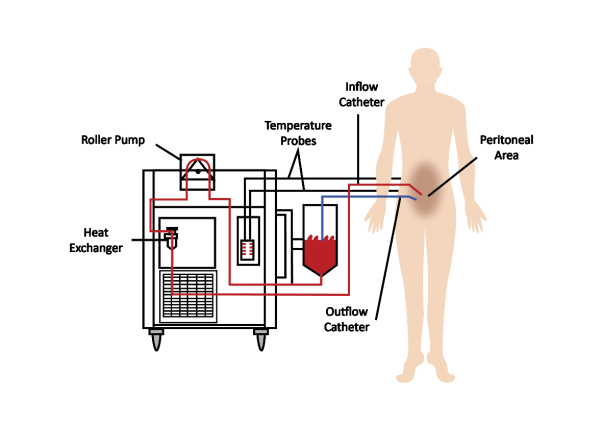
Following tumour removal, some cancers may recur after a period of remission. Recurring cancers are often found in the abdomen of the patient. Hyperthermic Intraperitoneal Chemotherapy (HIPEC) is the latest treatment to target recurring cancer in the abdomen.
HIPEC is increasing widely used in major oncology centres around the world. It is frequently used to treat recurring colorectal cancers in Malaysia.
Besides being more effective than systemic chemotherapy, HIPEC causes less undesirable side effects to the patient. Patients who undergo HIPEC have been shown to have longer remission periods and higher survival rates.

Conventional systemic chemotherapy
Recurring cancers in the abdomen are difficult to treat conventionally. Systemic chemotherapy often has limited effectiveness for treating recurring cancers in the abdomen as the chemotherapeutic agent is partly digested by the liver before it can reach the cancer cells.
As a result, the chemotherapeutic agent dosage delivered to the cancer cells is greatly reduced and loses its effectiveness.
Increasing chemotherapeutic agent dosage will cause more negative side effects to patients, making it difficult for them to complete the treatment.
Benefits of HIPEC
HIPEC is a procedure that delivers the chemotherapy treatment directly to the abdominal cavity following tumour removal surgery. This treatment delivers high-dose chemotherapeutic agents directly to the cancer cells in the abdomen.
HIPEC is a great option for cases where traditional methods of chemotherapy cannot be administered. It also provides deeper penetration of the drugs due to the high temperature which makes the blood vessels expand.
The process is considered a good innovation as it improves the long-term outcomes for patients.
Additionally, HIPEC has fewer side effects compared to traditional chemotherapy because the cancer-fighting drugs do not need to circulate all through the body.
HIPEC procedure
The HIPEC procedure is usually done as a last step in a cytoreductive surgery of the tumour. The whole process with surgery and HIPEC combined takes 6-8 hours. The patient is required to stay in the hospital for 7-10 days post-operation.
During HIPEC, a high dosage of the heated chemotherapeutic agent is delivered into the abdominal cavity. The duration of the HIPEC procedure is 90-110 minutes. Since the chemotherapy is contained in the abdomen only for a short duration, little agent is absorbed by the whole body, thus avoiding some negative side effects of conventional chemotherapy.
Furthermore, HIPEC allows the cancer cells to have direct exposure to the chemotherapeutic agent, thus increasing the effectiveness of treatment. Heating the chemotherapy agent to a temperature of 38oC enhances the cancer cells’ permeability to the agent that allows the cancer cells to be eliminated by the agent more effectively.
Some common negative side effects due to HIPEC are constipation, nausea, and surgical site infection. However, these can be treated non-surgically.
Patients eligible for HIPEC
Patients who are eligible to undergo HIPEC treatment are:
Older patients, patients with heart problems, kidney problems, stroke and limited mobility are not suitable to undergo this procedure.
Patients with cancer that has spread to the lungs, brain and bones are not suitable to undergo HIPEC as well.
Cancers treated by HIPEC
Some cancers that can be treated by HIPEC are:
Make an appointment at Gleneagles Hospitals
Gleneagles Hospital works with oncologists to assist patients through cancer treatment. Our caring and multidisciplinary team of healthcare professionals are available for consultation and to provide the best care.
Get in touch with us to find out more about our Oncology Services at your nearest Gleneagles Hospital.

Wait a minute

Wait a minute